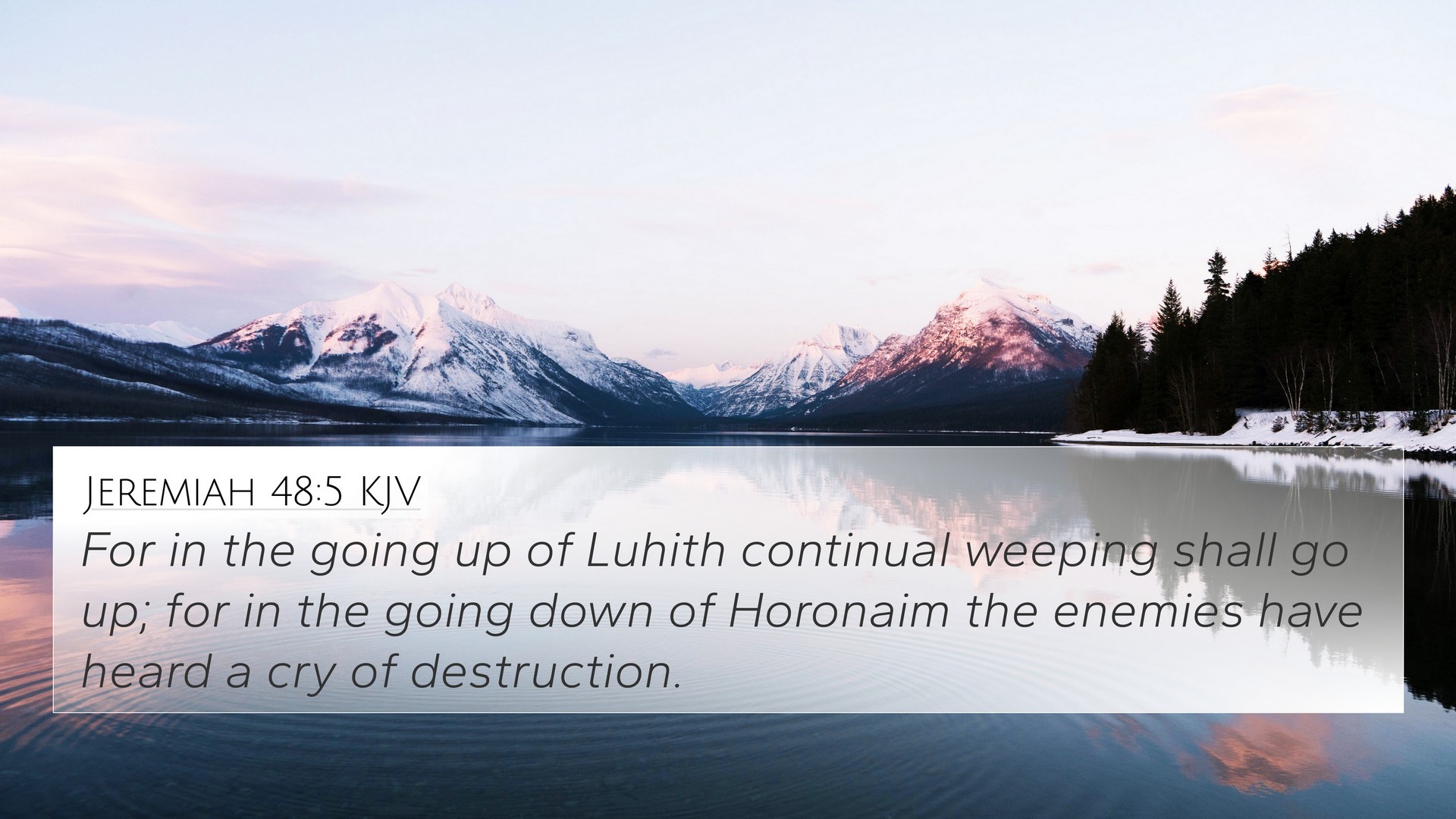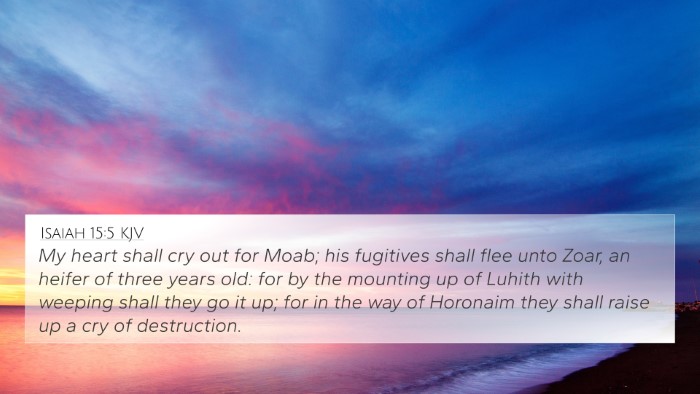Understanding Jeremiah 48:5
Jeremiah 48:5 reads: "For in the ascent of Luhith, with weeping they shall go up; for in the descent of Horonaim, the enemies have heard a cry of destruction." This verse reflects God's judgment against Moab, illustrating the anguish and despair that the people will experience as they face the consequences of their actions.
Summary of Biblical Meaning
This verse, situated within a broader prophecy against Moab, conveys themes of sorrow and lamentation. The two locations mentioned, Luhith and Horonaim, symbolize significant points in Moab's geography and their impending suffering.
Commentaries Insights
-
Matthew Henry:
Henry emphasizes the sorrowful condition of the Moabites as they face divine judgment. He notes that the weeping signifies a profound emotional state, marking a transition from pride to humility in their plight. He relates their weeping to a loss of strength and dignity.
-
Albert Barnes:
Barnes highlights that this lamentation is not just for personal loss but reflects a broader national calamity. He sees the 'cry of destruction' as a prophetic declaration that judgment is inescapable, indicating its severe implications for both individuals and the nation.
-
Adam Clarke:
Clarke supports the notion that these locations are literal but also represent spiritual states. He articulates that the ascent of Luhith signifies a rise in pain and suffering, paralleling the descent of Horonaim, portraying the duality of experience amidst divine judgment.
Cross-References and Related Verses
This verse connects with a variety of other Scriptures that enhance our understanding of its themes and implications. Below are some notable cross-references:
- Isaiah 15:5: "My heart cries out for Moab; her fugitives flee to Zoar, to Eglath-shelishiyah."
(Similar themes of lament for Moab's fate.)
- Jeremiah 48:7: "For because you trusted in your works and your treasures, you also shall be taken."
(Highlighting reliance on strength rather than God.)
- Ezekiel 25:8-11: "Thus says the Lord God: 'Because Moab and Seir said, 'Look, the house of Judah is like all the nations.'"
(Further judgments pronounced upon Moab.)
- Amos 2:1: "Thus says the Lord: 'For three transgressions of Moab, and for four, I will not revoke the punishment...'"
(Prophetic warning against Moab's transgressions.)
- Romans 9:25-26: "As indeed he says in Hosea, 'Those who were not my people I will call my people...'"
(A New Testament reference to God's mercy and judgment.)
- Micah 6:6-8: "With what shall I come before the Lord...?"
(Questions of righteousness and proper worship.)
- Luke 19:41-44: "And when he drew near and saw the city, he wept over it..."
(Jesus’ lamentation echoes similar themes.)
Exploring the Connections
The significance of Jeremiah 48:5 is deepened by examining the intertextual connections and thematic parallels within the Bible. The themes of divine judgment, lamentation, and national calamity resonate throughout both the Old and New Testaments. By connecting this verse to others, we observe a consistent biblical narrative regarding sin, judgment, and the hope for redemption.
Tools for Bible Cross-Referencing
To fully appreciate the insights from various scriptures, utilizing tools for Bible cross-referencing is vital. Resources such as a Bible concordance, cross-reference Bible study aids, and comprehensive Bible cross-reference materials can enrich the understanding of thematic connections. Effective study methods include:
- Using a Bible concordance to locate verses related to specific themes.
- Employing a cross-reference guide during personal study for in-depth engagement.
- Exploring Bible chain references which link verses thematically.
Conclusion
Jeremiah 48:5 serves as a poignant reminder of the realities of divine judgment and the importance of repentance. The connections with other Bible verses deepen our understanding of this passage and enhance our appreciation of the scriptural narrative as a whole. By actively engaging with these connections, believers can find guidance and wisdom to navigate the complexities of faith.



